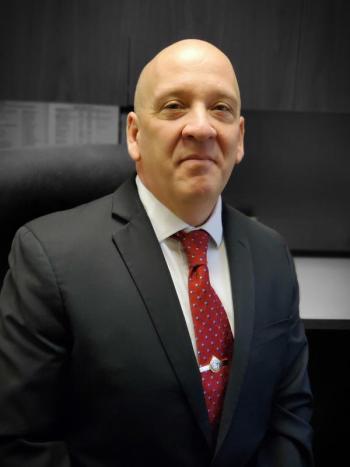In run for Waldo County Sheriff seat, Jason Trundy focuses on public safety, community connections
BELFAST — Waldo County Sheriff Jeff Trafton plans to retire after eight years in his position, and two candidates have announced their candidacy for the seat: Chief Deputy Jason Trundy, and Searsport Police Chief Todd Boisvert, of Searsport. Elections will be held Nov. 8.
Trundy has spent his 28 years in law enforcement serving in Waldo County, and his roots are long in the region. He graduated from Belfast Area High School, worked briefly for a family construction business, and then decided to pursue a career in law enforcement, which had always intrigued him.
Beyond a nascent interest, Trundy knew the Belfast Police officers, and realized that his personality fit with a career in law enforcement. Unlike today, when Trundy began his law enforcement journey there were plenty of younger people filling positions.
Trundy visited then Belfast Police Chief Bob Keating, who sent him to a 100-hour course in preparation for police work.
“When I came back there were no positions open in Belfast, but [Keating] suggested that the sheriff’s office may be hiring,” said Trundy.
After speaking with then-Sheriff Bob Jones, Trundy was told the Waldo County Sheriff’s Office was holding a class. Trundy seized the opportunity to get his foot in the door, and in May1994, he was hired as a part-time corrections officer.
“And here I am 28 years later,” he said.
The jail provided fundamental training in addition to invaluable experience.
“Once you get someone past the booking area — because back then it was just a traditional jail — I knew a lot of the people,” he said. “You begin to realize that it’s some poor decisions that led them where they are, and they’re really not a whole lot different than any of us. They have kids, families, jobs. It allowed me to put a human side to the work of law enforcement.”
Today, Trundy sees a troubling trend.
“I think nationally there is a lot of this division, and a lot of ‘us versus them,’” he said. “It is a mentality in different areas of the country. That’s just not how my career started. It started right, recognizing these were people I went to school with and families that I know. I think it [creates] a really good perspective.”
Trundy said his early career days, including the three years he spent at the jail, provided important perspective.
“When you’re a traditional police department, and there is something going on that causes you to arrest somebody, usually they’re not happy about that,” he said. “Oftentimes, people are intoxicated, or there is a reason. You take them to jail, fill out the form, and you’re out of there. From there, it is hands off.”
But, he said, in corrections, at the county jail: “From the time you drop them off, they’re your responsibility. It gives you the other half of law enforcement. That’s where the sheriff’s office is unique, with its patrol and its corrections facility. You need to know both sides of it.”
In 2008, he returned to Waldo County as jail administrator, which turned out to be right before a time of big changes with Maine’s county jail system.
System in upheaval
“I started on a Monday, and on Wednesday, Gov. John Baldacci announced that the state was going to take over county jails. And that’s when he announced his plan to close down three county jails: Waldo, Franklin, and Oxford.”
It didn’t exactly go that way, as Baldacci intended, but there were enough changes, and the Waldo County Jail ended up as an inspiration, while maintaining county control.
“That’s part of how we ended up changing into a reentry center,” said Trundy. “Sheriff Scott Story asked, ‘hey, instead of just shutting down and not using this space, we really need reentry centers in the state.’”
The county jail in Belfast was to be the first of four, according to initial plans. There were going to be three other reentry centers built around the state, “so everybody would have access to one,” said Trundy.
“But of course, [the newly created state Board of Corrections] went through all these strange changes, and then under Gov. Paul LePage, the operation piece came back to counties, with some budgeting pieces.”
It has been, “a long strange trip in corrections over the last 15 years,” said Trundy.
But that’s where and when he expanded his perceptions.
“My trip over there as the jail administrator during the transition between jail and reentry center really gives me a very firm understanding of the corrections side of the operation,” he said. “As the chief deputy for the last seven years, my chief role is in both operations — the civil paperwork service piece, patrol and the corrections division. I have a very well rounded experience with the operations of both sides of the sheriff's office.”
The Reentry Center opened its doors in 2010, with programming in place. The Reentry Center is a program that must be applied for, and houses a number of incarcerated men who are trying to turn their lives around. The Center offers counseling, groups, training, and programming for those with substance abuse issues and/or mental health struggles.
A wide breadth of experience
During his 28 years at WSO, and in addition to being jail administrator, Trundy held a number of positions, including patrol officer and detective for eight years.
With the latter, he dealt with serious crimes, such as burglaries, sexual assault and child abuse cases.
“Being able to go in and try to make some of these kids’ situations better provides a real sense at the end of the day that you’re really making a positive impact on people’s lives,” he said.
For two of his years as detective, Trundy was assigned as a resident agent for the Maine Drug Enforcement Agency.
He also served for five years as the patrol lieutenant, and was constantly busy, learning a lot about law enforcement operations, in general.
“That position is kind of a hub for everything going on,” he said.
Trundy said his time as chief deputy has been perhaps the most rewarding, given that he has been able to work more in the community.
“I consider myself incredibly fortunate to have had the ability to do a bunch of different things,” he said. “Not everybody gets that opportunity.”
“You spend your entire career with these experiences, formulating your philosophy about policing, how it should be done and how it could be more effective,” he said. “When you you're the chief deputy assigned to oversee all of these operations, and you work for somebody like Jeff [Trafton] — I’ve been fortunate that he has allowed me to pursue some things that I’m passionate about while I’ve been there — and that’s when you get to affect philosophy and expectations, and make some changes.”
When Waldo County initiated a recovery committee, it began with citizens sitting around, and , “talking about how we can better communicate and use each other’s resources,” he said.
They looked to Lincoln County, where a group there had set up a collaborative, and used that as a base model.
“We brought faith-based communities together, treatment providers for substance users, mental illness, and we just forced ourselves to get together every week and address every barrier that came up,” said Trundy.
The Committee talked about how to reduce barriers and work together, how help people go from reentry to treatment, and back into the community.
The impact of bringing many community organizations together has led to many impressive spin-offs, Trundy said.
That type of collaboration has led to impressive spin-offs, said Trundy, including funding for community-focused positions within the WSO, such as the community liaison. The funding comes from a million dollar grant received by Penobscot County Health Center.
The Rural Communities Opioid Response Program Implementation Grant is awarded by the U.S. Department of Health and Human Services, Health Resources and Services Administration. It is intended to be utilized by community partners to implement a set of prevention, treatment, and recovery activities over a three-year project period.
Restorative Justice spun off with justice centers, and the Health Equity Alliance works with Restorative Justice in Knox County to do the Law Enforcement Assisted Diversion program and build case management.
Volunteers of America also received a Project Connect grant for post-release case management. Volunteers of America “is a nonprofit organization founded in 1896 that provides affordable housing and other assistance services primarily to low-income people throughout the United States,” according to their website.
These partnerships serve as a foundation for constructive work, said Trundy, with the help of significant grants.
And he wants to continue those efforts as Waldo County Sheriff, as part of the next chapter of change, while adhering to the fundamentals of public safety.
“Our goal should be enhancing public safety,” he said.
It’s a goal Trundy wants to accomplish by bringing community organizations together, without groups being isolated in their own “silos,” and without using enforcement, arrest or incarceration as the only way to address the many issues encountered daily.
“You look at some of these issues that we’re facing in our community right now — homelessness, trauma, childhood trauma, substance use disorder and mental illness — all of these things that are causing people to come in contact with us,” he said. “Why would we not want to get the right resources into the community in the moment to address those needs, rather than just simply sending a cop to address them.”
Community focus, bridges built
The creation of the community liaison position in the sheriff’s office has helped to bridge the gap between police and social services.
“[The PCHC] grant was really focused specifically on the opioid crisis,” he said.
But the Sheriff’s Office wanted a position to include a focus on substance abuse and mental illness.
The position has expanded over the last several years, with it now a budgeted position at the WSO.
Trundy said in the future he hopes to further expand the position, and believes the role could be helpful for many law enforcement interactions. Trundy pointed to the wellness checks that are part of the everyday duties of a deputy, who are often called to drop in on seniors, or respond to calls with people struggling with mental health or substance abuse issues, or other non-police matters.
“When an officer goes, he’s looking at it from the point of view of, ‘are they OK, are they safe, and have they not harmed themselves,’” said Trundy. “As long as the person is there and safe, hasn’t harmed themselves and aren’t going to, really a law enforcement role has kind of been satisfied, but that doesn’t mean that all of those underlying issues aren’t there.”
That’s why, he said, the current community liaison, Rob Porter, has become such an important part of many law enforcement encounters.
Trundy would have liked to see such a position back when he, himself, was a young deputy.
“I’m not a soft-on-crime person,” he said. “I’m not about everybody gets a get-out-of-jail-free card. I believe that enforcement, arrest and incarceration will always have a place in the world of public safety. But we’re missing the bigger picture if we don’t realize there are lots of other ways that we can affect public safety.”
Root cause policing
For Trundy, if the root cause of a citizen’s problem can be addressed before it progresses into police matter, the community as a whole is better off.
“Sending some cops to tear down a homeless camp and sending them to the next town isn’t really addressing these underlying issues,” he said. “We need to rethink how we’re doing.”
He keeps a sign in his office, one of which says, “root cause policing.”
He keeps it there so that he does not lose focus on addressing symptoms of underlying issues.
“It doesn’t mean that when someone is committing a crime they won’t be dealt with, but if [law enforcement] is not keeping in mind that there are social drivers behind that, then how effective are we being in stopping the revolving doors that just keep coming through the system,” he said.
This is a philosophy that explains why the reentry center is important to Trundy.
It allows people to break the cycle, he said, and to obtain services to address underlying issues that lead to their interactions with law enforcement.
By addressing substance abuse, providing anger management tools, or other reasons that are driving criminal behavior, “we could break that cycle,” he said.
In addition, the rate of recidivism would be reduced, which, in turn, would help, “prevent spending untold billions of dollars in this country on just warehousing people and use that money better to stop people from committing crimes in the first place,” said Trundy.
“The worst thing we can always say is, ‘well that’s the way we’ve always done it,’” he said.
It’s more than one person
Trundy has already announced his chief deputy, should he be elected in November.
That is to be Matt Curtis, whom shares much of Trundy’s values, he said.
“[Curtis has] been right there beside me as things have developed, he sees the value in a lot of these things,” said Trundy. “He’s not me. He has his own views, but he and I see a lot of these situations similarly, so I know that his mindset, his philosophy about what he expects, and how we do our job, and why we do it the way we do it.”
Leadership, to Trundy, is about carrying the work forward.
“Really that should be the role of any leader. I mean, I’m not going to be here forever,” he said. “When I go to town meetings and I talk about why I want to be sheriff, I want to be sheriff because of my connection to this community, because of the work I’ve done, because of the philosophy we’ve had, and because I want to see that continue in the future. I want those people that believe the way I do, and see this profession the way I see it.”
Top issues Waldo County faces in 2022, and beyond
Waldo County Sheriff’s Office, like law enforcement entities across the country, faces a lean pool of personnel. Add that to the current concerns due to the fact that the Maine State Police are also contending with fewer staff; consequently, there are fewer troopers on the rural roads.
It’s only a matter of time before state police resources are trimmed further, and additional responsibilities will fall on the WSO.
Waldo County spans 800 square miles and includes 26 towns. Belfast and Searsport have their own police departments, and Islesboro has one officer, part time. Which leaves the majority of law enforcement to fall on the shoulders of the WSO, with its 22 sworn officers.
Last year, the WSO responded to 9,000 calls, making 425 physical arrests, another 100 and something criminal summonses, “and we did 1,200 traffic stops, even with all the COVID restrictions,” said Trundy.
The deputies are running constantly, he said, “and every time they make an arrest they’ve got to come back here, type a report, they’ve got to get all their stuff together and submit it to the District Attorney.”
He sees an eventual need for more personnel, including those that focus primarily on traffic enforcement.
Trundy also wants to fill an open position for a deputy affiliated with the Maine Drug Enforcement Agency. The position was filled in 2019, but for personal reasons the deputy chosen requested to change positions. The position has been vacant since.
“Overdose deaths are crazy,” he said. There is a lot of fentanyl, a lot of drugs coming into the community. We need to address that flow of drugs in while we at the other end of that try to address the user end. I want to continue expanding.”
And, he wants to expand the role of the community liaison to focus on domestic violence. Current Sheriff Jeff Trafton created the Domestic Violence task force during his tenure, and put the issue at the forefront of SO work.
Trundy said the WSO responds to many disturbances and domestic disturbances that never result in arrest.
“That doesn’t mean there are no underlying issues there,” he said. “If I’m only sending a law enforcement officer there, he’s looking to say, ‘has there been a crime committed.’”
Trundy wants to explore partnering with an agency, such as New Hope, a nonprofit based in Rockland that focuses on domestic violence prevention.
“If I can get a trained domestic violence advocate to some of these situations before they become crimes, maybe they could work with some of these folks to address some of these underlying issues and steer it away from being a criminal element,” he said.
The foundation of how you’ll do it
Trundy talks about the foundation of law enforcement, and the motivation for being in the field. His is grounded on community connection, its safety, quality of life, and future work built on root cause policing.
He wants to continue establishing a law enforcement culture that extends beyond arrests, bookings and jail time; one works with social service agencies and nonprofits to mend the core issues that affect the entire community. He has until November to convince voters that he is the man for the job, and will be taking his campaign to the towns that comprise Waldo County, and their citizens.
Erica Thoms can be reached at news@penbaypilot.com

































